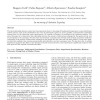Free Online Productivity Tools
i2Speak
i2Symbol
i2OCR
iTex2Img
iWeb2Print
iWeb2Shot
i2Type
iPdf2Split
iPdf2Merge
i2Bopomofo
i2Arabic
i2Style
i2Image
i2PDF
iLatex2Rtf
Sci2ools
106
click to vote
AUTOMATICA
2008
2008
Communication constraints in the average consensus problem
The interrelationship between control and communication theory is becoming of fundamental importance in many distributed control systems, such as the coordination of a team of autonomous agents. In such a problem, communication constraints impose limits on the achievable control performance. We consider as instance of coordination the consensus problem. The aim of the paper is to characterize the relationship between the amount of information exchanged by the agents and the rate of convergence to the consensus. We show that time-invariant communication networks with circulant symmetries yield slow convergence if the amount of information exchanged by the agents does not scale well with their number. On the other hand, we show that randomly time-varying communication networks allow very fast convergence rates. We also show that, by adding logarithmic quantized data links to time-invariant networks with symmetries, control performance significantly improves with little growth of the req...
Related Content
| Added | 08 Dec 2010 |
| Updated | 08 Dec 2010 |
| Type | Journal |
| Year | 2008 |
| Where | AUTOMATICA |
| Authors | Ruggero Carli, Fabio Fagnani, Alberto Speranzon, Sandro Zampieri |
Comments (0)

